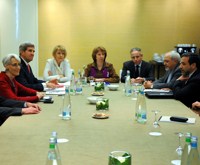Over the weekend the U.S.-led international negotiating team and Iran concluded an interim agreement in Geneva intended to verifiably limit Iran’s nuclear program in return for a partial relaxation of international economic pressure. The agreed upon “Joint Plan of Action” covers the next six months while the sides attempt to negotiate a comprehensive final agreement that would resolve the question of Iran’s nuclear status.
While President Barack Obama said in a statement following the finalization of the agreement that the Iranian people have a chance at “rejoining the international community,” the nuclear issue is hardly the only obstacle to a normalized U.S.-Iranian relationship. Secretary of State John Kerry told CNN on Sunday that certain things “have to change” in order to “really change the relationship.” These include Iran’s relationship with Hezbollah and the country’s sponsorship of terrorism. Kerry expressed the hope that “President [Hasan] Rouhani and Foreign Minister [Javad] Zarif want to build this different relationship.”
Progress with Iran on regional diplomatic and security issues important to the United States, such as human rights and the future of Syria, will almost certainly depend on progress on the nuclear issue. Reza Marashi of the National Iranian American Council, who left the State Department’s Office of Iranian Affairs in 2010, said in a phone interview that the nuclear issue “has become the 8,000 pound gorilla in the room,” and has meant that other issues “have fallen by the wayside.” Regardless of whether the United States wants to deal with Iran directly, however, “the Iranians have created a seat for themselves at the table” when it comes to the most important issues affecting the Middle East, he said.

